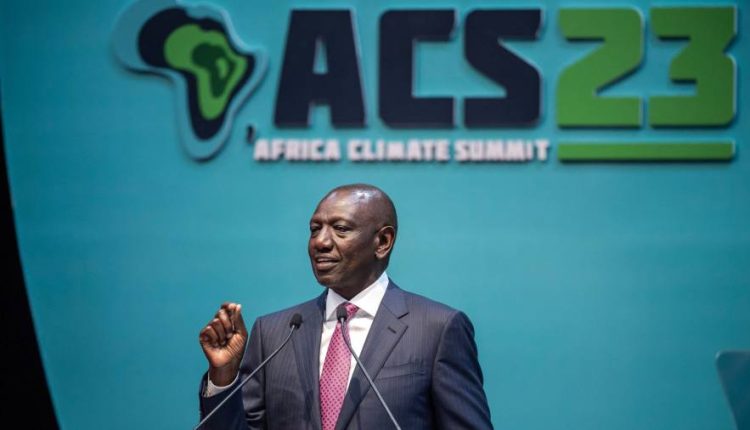Receive free Climate change updates
We’ll send you a myFT Daily Digest email rounding up the latest Climate change news every morning.
Kenya’s president has called for a global debt relief deal to help indebted African nations fight the damaging effects of climate change, insisting the two issues are indelibly linked.
William Ruto said most countries on the continent lacked the finance needed to address a range of pressing issues, including climate change, following debt defaults in Zambia and Ghana over the past years.
“If you don’t solve the debt issue, you can’t solve the climate issue,” he told the Financial Times at the first Africa Climate Summit, being held this week in Kenya’s capital Nairobi. “A new instrument is needed for these countries — finding ways to pre-empt default before it happens.”
Almost half the countries in sub-Saharan Africa are either in or at high risk of debt distress, including Kenya, according to the World Bank.
Rwanda’s president Paul Kagame, US climate envoy John Kerry and European Commission president Ursula von der Leyen have joined two dozen African presidents and 30,000 delegates at the three-day gathering.
There has been debate on a range of issues, including how to supply reliable carbon credits that would allow polluters to offset their emissions by investing in renewable energy while being mindful of the significant impact that climate change is already having on Africa.
Africa accounts for just 4 per cent of global greenhouse gas emissions, “yet it suffers some of the worst effects of rising global temperatures,” UN secretary-general António Guterres said on Tuesday.
One proposed solution would be to allow for debt repayments to be extended and for a decade-long grace period to be introduced, allowing money to be invested elsewhere. “So instead of spending billions of dollars paying debt this year, we use that to do other things. And then in 10 years’ time, we would have stabilised our economies, we can pay,” Ruto said.
“We don’t want to suggest we want a debt write-off. No, we want to pay,” he added. Kenya currently pays up to $8bn annually to service its debts.
Shortfalls for lenders could be covered through an expansion of special drawing rights and additional leveraging on balance sheets, he said. “Nobody’s losing money, we just postpone the date,” Ruto said. “It doesn’t require rocket science.”
Kenya is enduring one of its worst droughts, which has killed 2.5mn heads of livestock over a year. “That $1.5bn loss is a direct consequence of climate change,” Ruto, a trained botanist and zoologist, said of the financial impact.
Ruto stressed that China, which has sent officials to the Nairobi summit, had to be part of the “conversation” as its lenders accounted for 12 per cent of Africa’s private and public external debt. “China is here because they’re an interested party. They cannot walk away from this conversation about debt distress,” Ruto said.
Africa could, with the right funding, harness its natural assets and energy resources. The Congo river basin alone has carbon capacity equivalent to 15 years of US emissions.
Ruto said he wanted to raise Africa’s share of the annual $3.5tn global investment needed to achieve the Paris climate accord’s goals of 45 per cent emissions reduction by 2030 and net zero by 2050. “At the moment, only 1 per cent of renewable financing resources comes to Africa, so our push is to get it to 10 per cent by 2028 and to 40 per cent by 2050,” he said.
The Kenyan president said the Nairobi gathering — which comes ahead of a UN climate conference in New York this month and the COP28 UN meeting in the UAE in November — was also an attempt to move away from the focus on droughts and famines to “green growth and climate finance”.
“This summit is to consolidate African ideas because it’s always been ‘Africans are complaining’, that we’re the victims,” Ruto said. “While all that is true . . . we have ideas on how to solve the problem of climate change.”
The delegates expect to produce a “Nairobi declaration” at the end of the summit. The leaders are keen to emphasise a long-targeted goal of boosting clean energy production across a continent where 640mn people still lack access to power and building a $6bn market for carbon reduction projects by 2030. They could also demand that rare metals mined in Africa should be processed there.
UAE entities pledged at the summit on Tuesday to pour in $4.5bn to develop 15GW of clean power in Africa by 2030. Africa has a target of 300GW clean energy by 2030, up from 56GW in 2022.
Ruto said Kenya would push for a global agreement on the phase out of unabated fossil fuels by 2050 at the UAE-hosted COP28 summit, and even to “sharpen that deadline”.
Yet in an open letter to Ruto, 500 activist organisations argued that the summit was proposing “false solutions” that have been “marketed as African priorities”, including carbon markets and carbon sequestration. These, the letter argued, were western “interests”.
Read the full article here

